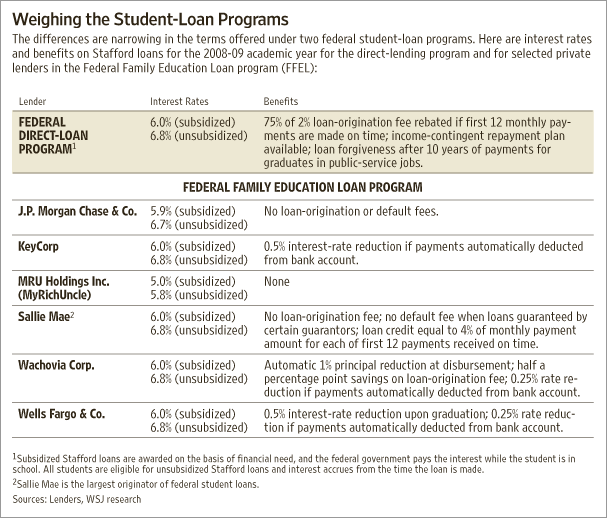- Joined
- Jun 17, 2004
- Messages
- 1,450
- Reaction score
- 2
Got a note from my lender saying that since the feds cut their incentives, the lender will reduce incentives to us. It is likely that other lenders will do the same (to some degree?). This will take effect after the current financial aid year.
For instance the lender below was offering a 1% rate reduction on unsubs, but will no longer offer it after the current financial aid year unless feds re-instate their incentive. If you're currently in school and not graduating soon, check with your lender to see if they will discontinue incentives on any future loans. This should not effect existing/current loan incentives.
Text from lender follows:
Thank you for utilizing Graduate Leverage to mitigate your student debt burden. As part of our advisory service, we provide periodic updates on market rates and regulations. This is a general informational update and thus does not require any action on your part.
Regulatory Update
The recent passage of the College Cost Reduction and Accessibility Act has resulted in several significant changes for the federal student loan program.
Below is a brief overview of some of the changes impacting graduate students:
·Creation of Income Based Repayment Plan (IBR): A new government program available in 2009 provides a significantly reduced federal loan payment and potential savings on subsidized interest for qualifying individuals. IBR limits your annual debt payment to 15% of your discretionary income. Any interest on your subsidized loans not covered by your reduced payment is paid by the government for up to three years.
·Lender Subsidies Decreased: Future borrower benefits for federal loans will likely diminish across the industry as a result of the significant cuts to the fees lenders receive from the government. The benefits on your current loans with Graduate Leverage will not change.
Interest Rate Update
·The Federal Reserve has lowered the federal funds rate three times in the past quarter; on September 18, October 31, and December 11. As a result, the prime rate is now 7.25%. This affects all private (alternative) loan rates and creates an environment in which a private loan may be more attractive than a Graduate PLUS for some students.
Graduate Leverage is continuing to monitor the market, and will be sending your personalized recommendation to assist with loan selection early this spring. If you have any questions or need assistance, please call 888-350-8488.
Sincerely,
The Graduate Leverage Team
For instance the lender below was offering a 1% rate reduction on unsubs, but will no longer offer it after the current financial aid year unless feds re-instate their incentive. If you're currently in school and not graduating soon, check with your lender to see if they will discontinue incentives on any future loans. This should not effect existing/current loan incentives.
Text from lender follows:
Thank you for utilizing Graduate Leverage to mitigate your student debt burden. As part of our advisory service, we provide periodic updates on market rates and regulations. This is a general informational update and thus does not require any action on your part.
Regulatory Update
The recent passage of the College Cost Reduction and Accessibility Act has resulted in several significant changes for the federal student loan program.
Below is a brief overview of some of the changes impacting graduate students:
·Creation of Income Based Repayment Plan (IBR): A new government program available in 2009 provides a significantly reduced federal loan payment and potential savings on subsidized interest for qualifying individuals. IBR limits your annual debt payment to 15% of your discretionary income. Any interest on your subsidized loans not covered by your reduced payment is paid by the government for up to three years.
·Lender Subsidies Decreased: Future borrower benefits for federal loans will likely diminish across the industry as a result of the significant cuts to the fees lenders receive from the government. The benefits on your current loans with Graduate Leverage will not change.
Interest Rate Update
·The Federal Reserve has lowered the federal funds rate three times in the past quarter; on September 18, October 31, and December 11. As a result, the prime rate is now 7.25%. This affects all private (alternative) loan rates and creates an environment in which a private loan may be more attractive than a Graduate PLUS for some students.
Graduate Leverage is continuing to monitor the market, and will be sending your personalized recommendation to assist with loan selection early this spring. If you have any questions or need assistance, please call 888-350-8488.
Sincerely,
The Graduate Leverage Team

